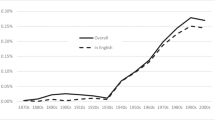Abstract
Dependency theory has cast new light on the workings of the international political economy, and on the relations between more and less developed countries. Insofar as dependency theory aims at specifying generalsystemic constraints on the behavior of Third World states, its ability to explain/predict how particular Third World states respond to these constraints is limited.
Our concern is with the foreign policy responses of the LDCs. The comparative foreign policy approach to this question has attempted to account for cross-national variation in foreign policy responses of LDCs with variation in theirdomestic features, i.e., attributes, capabilities, and regime types. Here we suggest that an understanding of the foreign policies of the LDCs can be enhanced by adding an explicitly dyadic perspective to dependency and comparative foreign policy approaches, conceptualized as a form of patron-cliency.
Similar content being viewed by others
References
AMIN, S. 1976Unequal Development: An Essay on the Social Formation of Peripheral Capitalism. New York: Monthly Review Press.
ARMSTRONG, ADRIENNE 1981 The Political Consequences of Economic Dependence.Journal of Conflict Resolution 25: 401–428.
BANERJEE, SANJOY 1987 Explaining the American ‘Tilt’ in the 1971 Bangladesh Crisis: A Late Dependency Approach.International Studies Quarterly 37: 201–216.
BROWN, S., PRICE, D., and RAICHUR, S. 1976 Public Good Theory and Bargaining Between Large and Small Countries.International Studies Quarterly 20: 393–414.
CARDOSSO, F.H. and FALETTO, E. 1979Dependency and Development in Latin America. Berkeley: University of California Press.
DOLAN, M. and TOMLIN, B. 1984 Foreign Policy in Assymetrical Dyads: Theoretical Reformulation and Empirical Analysis, Canada-United States Relations, 1963–1972.International Studies Quarterly 28: 349–368.
DUNCAN, G. and SILVERSON, R.M. 1982 Flexibility of Alliance Partner Choice in a Multipolar System.International Studies Quarterly 26: 511–538.
DUVERGER, MAURICE 1954Political Parties: Their Organization and Activity in the Modern State. Translated by North and North: New York: John Wiley and Sons.
EISENSTADT, S. and RONIGER, L. 1984Patrons, Clients, and Friends. Cambridge: Cambridge University Press.
FEINBERG, RICHARD 1983The Intemperate Zone; The Third World Challenge to U.S. Foreign Policy. New York: W.W. Norton.
FOSTER, GEORGE M. 1967 The Dyadic Contract: A Model for Social Structure of a Mexican Village. InPeasant Society: A Reader, pp. 213–230. Edited by J. Potter, M. Diaz, and G. Foster. Boston: Little, Brown.
FROLICH, N. and OPPENHEIMER, J. 1970 I Get By With a Little Help From My Friends.World Politics 23: 104–120.
JENTLESON, BRUCE W. 1987 American Commitments in the Third World: Theory vs. Practice.International Organization 41: 667–704.
JOHNSON, ROBERT H. 1985 Exaggerating America’s Mistakes in Third World Conflicts.International Security 10: 32–68.
KEY, V.O. JR. 1952Politics, Parties, and Pressure Groups. New York: Thomas Y. Crowell.
— 1956American State Politics: An Introduction. New York: Alfred A. Knopf.
KNORR, KLAUS 1975The Power of Nations. New York: Basic Books.
LANDE, CARL C. 1973 Networks and Groups in Southeast Asia: Some Observations on the Group Theory of Politics.American Political Science Review 67: 103–127.
— 1983 Political Clientelism in Political Studies, Retrospect and Prospects.International Political Science Review 4: 435–454.
LASWELL, HAROLD D. 1951 Factions.Encyclopedia of the Social Sciences. 6th ed.: 51.
LEMARCHAND, R. and LEGG, K. 1972 Political Clientelism and Development, A Preliminary Analysis.Comparative Politics 4: 149–178.
LISKA, GEORGE 1978Career of Empire: America and Imperial Expansion Over Land and Sea. Baltimore: Johns Hopkins University Press.
MAIR, LUCY 1961 Clientship in East Africa.Cahiers d’Etudes Africaines 2: 315–326.
MOON, BRUCE 1983 The Foreign Policy of the Dependent State.International Studies Quarterly 27: 315–340.
NEUBAUER, D. and KASTNER, L. 1969 The Study of Compliance Maintenance as a Strategy for Comparative Research.World Politics 21: 629–640.
RAPKIN, D. and AVERY, W. 1986 World Markets and Political Instability Within Less Developed Countries.Cooperation and Conflict 21: 99–117.
RICHARDSON, N. 1976 Political Compliance and U.S. Trade Dominance.American Political Science Review 70: 1098–1109.
RICHARDSON, N. and KEGLEY, C. 1980 Trade Dependence and Foreign Policy Compliance, A Longitudinal Analysis.International Studies Quarterly 24: 191–222.
SCOTT, JAMES C. 1972 Patron-Client Politics and Political Change in Southeast Asia.American Political Science Review 66: 91–113.
SHOEMAKER, C. and SPANIER, J. 1984Patron-Client State Relationships. New York: Praeger.
SINGER, MARSHALL R. 1972Weak States in a World of Powers: The Dynamics of International Relationships. New York: The Free Press.
SMALL, M. and SINGER, J. 1973 The Diplomatic Importance of States, 1816–1970.World Politics 25: 577–589.
SNYDER, GLENN H. 1984 The Security Dilemma in Alliance Politics.World Politics 36: 461–490.
SPIEGEL, STEVEN L. 1972Dominance and Diversity. Boston: Little, Brown.
TUCKER, ROBERT W. 1968Nation or Empire?: The Debate Over American Foreign Policy. Baltimore: Johns Hopkins University Press.
WATERBURY, JOHN 1977 An Attempt to Put Patrons and Clients in Their Place. In Gellner and Waterbury, eds.,Patrons and Clients, 329–341. London, Gerald Duckworth and Co. Ltd.
WOLF, ERIC 1966 Kinship, Friendship, and Patron-Client Relations. In M. Banton, ed.,The Social Anthropology of Complex Societies, 3–27. New York: Little, Brown.
ZARISKI, RAPHAEL 1960 Party Factions and Comparative Politics: Some Preliminary Observations.Midwest Journal of Political Science 4: 27–51.
Author information
Authors and Affiliations
Rights and permissions
About this article
Cite this article
Carney, C.P. International patron-client relationships: A conceptual framework. Studies in Comparative International Development 24, 42–55 (1989). https://doi.org/10.1007/BF02687171
Issue Date:
DOI: https://doi.org/10.1007/BF02687171




